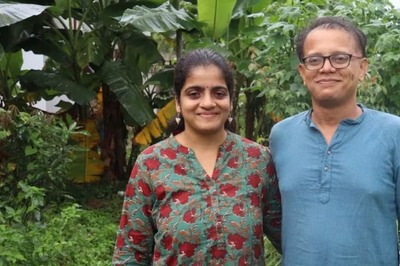
views
Sanitation is a basic human right, yet millions of people in India lack access to safe and hygienic toilets. This poses a serious threat to their health, dignity, and well-being. Moreover, the burden of poor sanitation falls disproportionately on women – both at home and outside. The women who work in sanitation often also face harassment, violence, and discrimination. These are the women who clean our toilets, drains, sewers, and septic tanks. Essentially the women who make it possible for people like us to live in clean surroundings.
The stigma aside, the work itself can be dangerous due to the lack of adequate protections. They often work in hazardous and degrading conditions, exposing themselves to infections, injuries, and stigma. They are also paid meagre wages and denied social security and dignity.
For many of these women, their journey towards transformation began with the Harpic World Toilet College (HWTC).
Harpic set up India’s first HWTC in 2016, with the stated objective of improving the quality of life of sanitation workers through their rehabilitation by linking them with dignified livelihood options. The college operates as a knowledge sharing platform with an aim to uplift the lives of the sanitation workers by educating them about their rights, health hazards, use of technology and alternate livelihood skills. Workers trained by the college are provided placement with various organisations. Following the successful proof of concept in Rishikesh, HWTCs have opened in Maharashtra, Aurangabad, in partnership with Harpic, Jagran Pehel and Maharashtra Government.
The All Women’s Harpic World Toilet College (AWHWTC) in Puducherry takes this a step further by focusing its efforts only on women sanitation workers. Established in 2022, the college has already had a positive impact on the municipalities of Puducherry, who now have access to a steady stream of experienced and well trained sanitation workers who work with pride.
For women like Kuppamal, however, the experience of AWHWTC has been nothing short of life changing. In the not-so-distant past, sanitation workers like Kuppamal encountered hazardous situations daily, navigating through their duties without proper knowledge or safety measures. The world was oblivious to the risks they faced and the sacrifices they made to keep our cities clean. Today, as a trained sanitation worker, she is better able to safeguard her own health and that of her family, while also making the city safer for all.
Ensuring Safety Through Education
Many women, like Kuppamal, enter the sanitation profession without formal education or training, exposing them to significant health risks inherent in their profession. AWHWTC’s comprehensive training programs dive deep into safe sanitation practices, waste management, and the use of protective equipment. This not only makes these sanitation workers better at their jobs, but also makes them more aware of health risks and preventive measures.
The college goes a step ahead and provides Personal Protective Equipment (PPE) to all students. Once equipped with gloves, masks, suits, and other essentials, these women aren’t just safer, but are also treated with more respect and dignity as their perception amongst the public changes. AWHWTC also provides regular tetanus injections to all students, in addition to other proactive healthcare measures, helping the women circumvent illnesses and be more productive and healthy.
Elevating Social Status
Discrimination and social isolation are challenges faced by women sanitation workers. AWHWTC’s training instills confidence, pride, and a sense of professionalism in their work, transforming them into skilled professionals. By securing jobs in the organized sector and wearing uniforms, these women gain respect in their communities, breaking the stigma associated with their profession.
Creating Better Employment Opportunities
AWHWTC actively collaborates with various organizations to create better employment opportunities for women sanitation workers in Puducherry. Placements in critical sectors, such as hospitals and hotels, not only enhance their roles in maintaining sanitation and hygiene but also contribute to the overall well-being of the community.
Enabling Financial Security
Financial security is a critical aspect of empowerment for women sanitation workers, many of whom are the sole breadwinners in their families. AWHWTC’s training programs lead to better-paying jobs with additional benefits such as Provident Fund (PF), Employees’ State Insurance Corporation (ESIC), and insurance, ensuring a more stable and secure future.
Moreover, the college also enables more women in the workplace by offering daycare facilities for the children of sanitation workers. This thoughtful initiative not only supports the workers in their daily responsibilities but also contributes to the overall welfare of the community. It recognizes the dual roles these women play – as dedicated workers and as nurturing mothers.
Enhancing Soft Skills
Recognizing the importance of soft skills in personal growth and career advancement, AWHWTC incorporates training that goes beyond technical expertise. The emphasis on soft skills prepares these women for comprehensive personal and professional development.
The curriculum includes soft skill training, empowering these women with the tools they need to navigate professional challenges effectively. From interview skills to leadership development, the college aims to create not just skilled workers but confident leaders in the sanitation sector.
Inspiring Change Beyond Themselves
The impact of AWHWTC extends beyond the individual workers, creating a ripple effect that transforms entire communities. Through improved salaries, enhanced respect, and tangible contributions to family welfare, the empowerment of women sanitation workers illustrates the transformative power of education and empowerment.
A Brighter Future Through Empowerment
The All Women’s Harpic World Toilet College in Puducherry has emerged as a powerful force in empowering women sanitation workers. Through education, training, and advocacy, it has equipped these unsung heroes with the skills, confidence, and opportunities they need to lead better lives and make a more significant impact in their communities.
Harpic, as India’s leading brand in the lavatory care segment, understands the power that communication can wield. For years now, Harpic has created thought provoking campaigns that help bridge the education gap on toilet hygiene and toilet etiquette. Joining hands with News18, Harpic also created Mission Swachhta aur Paani, a movement that champions the cause of inclusive sanitation, equality for all genders, abilities, castes and classes and the strong belief that clean toilets are a shared responsibility.
Mission Swachhta aur Paani has taken on the mantle of communicating the ins and outs of toilet hygiene, by using its powerful platform to promote dialogue between decision makers and users, and by creating easy to consume resources for educators, activists, and people like us. By bringing to light stories of women like Kuppamal, Mission Swachhta aur Paani is making it possible for women sanitation workers all over the country to envision a better future for themselves and their families.
We invite you to do your bit. Learn how, here.




















Comments
0 comment